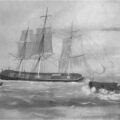Conjuring Green with Natalie Diaz

This is the drill when it comes to poetry workshops: print out enough copies of your poem, read it to a room full of strangers, and engage in a sort of poetry first aid. Cut a last stanza, trim a line, drop the dangling modifier, pull a title from a line in the poem, be clear, use commas, and voilà, your poem comes out newly buffed, ready to be sent out into the world. But what if, instead of seeing our poems as finished products, boxed and ready to ship, we see them as possibilities into something else? An opening? A questioning? What if, instead of fixing them up, we break them open and rebuild from there?
This is how Natalie Diaz opened her workshop at Tin House: see craft as possibility.
These were words I scribbled in my notebook but needed much more time to contemplate. I looked at my bunch of clean, if not over crafted poems, and tried to see them as doors to something else, as poems hiding other poems. What are the images that haunt you? Risk being overwhelmed. Mess it up so you feel something. I went through a series of emotional reactions. Something in me sank, at first, when she said this because I worried that my poems didn’t have enough feeling. My poems were not done under, what I had thought, was the last coat of polish. I then felt afraid of what could be lurking behind those doors. That fear, however, translated into excitement because I knew there was a deeper, longer, more thrilling path to travel. There was possibility for newness. For risk.
First Natalie began by blindfolding us. She passed around black eye masks so that instead of being so focused, and therefore distracted by how the poem looked on the page, we could focus on the images, the ones in our mind’s eye, that were charged with the most emotion. Make your words physical. You should feel them in your body. This is how we listened and discussed each other’s poems. We were blinded to the self-conscious regard of the others in the room and, behind the blackness of our eyelids, we could fully see the images that moved us: the room lit by the glass of milk, the goat’s head hanging by ropes in a tree, the lemon spilling a universe of gold. Language is energy—once you do it, you can’t take it back. Let the lightning out.
All of us had a lightning that was unique and special. We write sideways. And you are responsible for your words. You want to be caught in the wild field, outside of your body, in a wild, energetic place, where the hips of your lover have to be different each time: the pain, the joy, the hunger. Natalie wanted us to chase down those images and to trust our personal rhythms, the physicality of our language, the body of our line. This is when she assigned us to write a sort of body translation of Federico Garcia Lorca’s line “Verde que te quiero verde” which clumsily translates to “Green, how I want you green.” Chase the ecstatic. Grab onto that color, all the desire that can waterfall from it, and let it out. If you had a hive in your body, what would it be? I poured out green. I bled a green mess on the page, but in it, there was love. And it was in my body. And I realized then that this is a true point of departure.
A great teacher doesn’t only bring to their students the questions where they know the answer, but more importantly, they bring the questions that they are asking themselves too. They teach with their questions and open up the possibility of the answer being reached, collectively. And if there is no answer, a true community is born from the chase, from the process, from the rattling, wondering, and rewriting—a chase where we can admire each other’s speed, perspective, grace and humility. I didn’t realize, until after Tin House, that Natalie was chasing green with us too:
I am struck in the witched hours of want—I want her green life. Her inside me
in a green hour I can’t stop.
Green vein in her throat green wing in my mouthgreen thorn in my eye. I want her like a river goes, bending.
Green moving green, moving.
And our poems moving, too.
About Allison Albino
Allison Albino studied poetry at Sarah Lawrence College and has an MA in French Literature from NYU. She is the recipient of the Lucille Clifton Memorial Fellowship for the Community of Writers at Squaw Valley and has been a contributor at the Bread Loaf Writers' Conference and at Tin House. Her poems have appeared in Poetry Northwest and the Apeiron Review. She lives in New York City and teaches Middle and High School French at the Dalton School.





